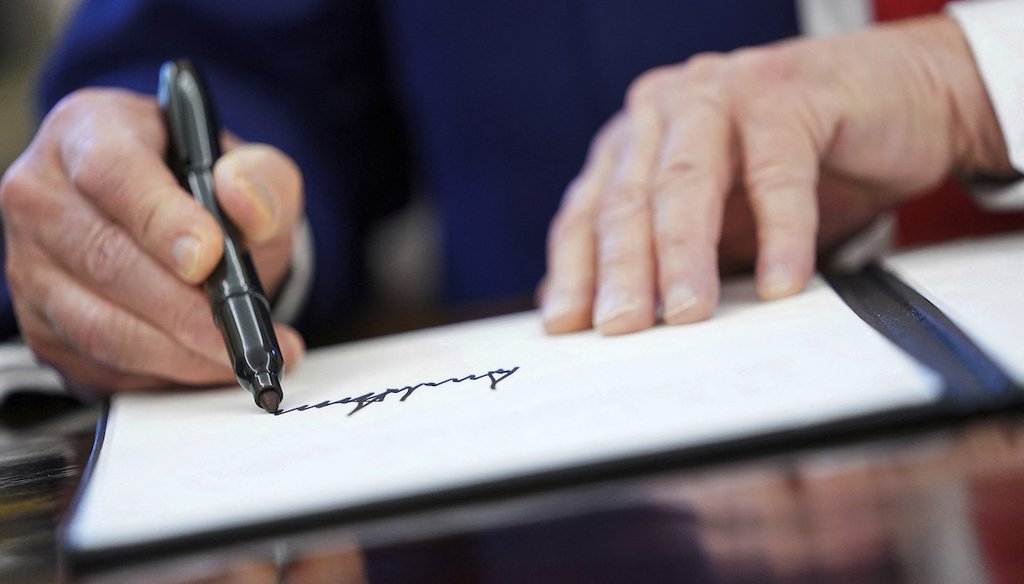Stand up for the facts!
Our only agenda is to publish the truth so you can be an informed participant in democracy.
We need your help.
I would like to contribute
Trump signs legislation introducing federal tax credit for school choice

President Donald Trump signs an executive order in the Oval Office of the White House, April 9, 2025, in Washington. (Pool via AP)
President Donald Trump's expansive tax and spending law includes the first-ever federal tax credit specifically for people who donate to support private school vouchers.
The new legislation adds a new option for people to support school choice programs, but does not guarantee what Trump describes as "universal school choice."
The term "school choice" generally pertains to policy or program initiatives that use public money to support families' alternatives to traditional local public schools. It includes public charter schools, private school voucher programs, online schools and homeschooling.
Trump has promised to expand programs supporting school choice to all states and give homeschooling families access to the same financial resources available to families of students who attend traditional K-12 schools. His tax and spending law included provisions that broadened how families can use 529 investment plans to cover homeschooling expenses, such as curricular materials and online education.
According to EducationWeek, a nonprofit, nonpartisan news organization that covers K-12 education, 30 states and Washington, D.C., already offered financial assistance to families for private schools, including vouchers and tax credits as of June 2025. Extending these programs to every state could increase students' educational options, but analysts warn that, even then, the Trump voucher program's reach is limited.
Critics argue that such policies increase education inequalities and erode public school resources and tend to benefit wealthier households.
"So-called school choice is really a policy shift to subsidizing private education with public tax revenues. A tax credit for tuition paid to private schooling — some of it religious education — takes money away from public education," Martin Carnoy, labor economist and professor at Stanford's graduate school of education, said.
Tax credit scholarships provide taxpayers with full or partial credits when they donate to designated nonprofits that dole out private school scholarships. Before the Educational Choice for Children Act, signed into law by Trump on July 4 within the larger spending package, these tax credit scholarships were state-based.
Trump promised in September 2023 to collaborate with states and Congress to ensure universal school choice for all American families. On Jan. 29, he signed an executive order directing the Education Department to guide states on how to use federal funding to back K-12 scholarship programs.
The July law introduces a permanent tax credit that allows people to donate up to $1,700 to a designated scholarship-granting organization. Donors are eligible for a 100% federal income tax credit — a discount on their tax bills. This means that a taxpayer who owes $10,000 to the IRS could donate $1,700 to a scholarship fund, reducing the tax payment to $8,300.
"At its core, this is an unprecedented use of public federal taxpayer dollars to pay for private and religious schools," Jon Whiten, deputy director of the Institute on Taxation and Economic Policy, a left-leaning think tank, said.
The program is scheduled to take effect Jan. 1, 2027. Congress' nonpartisan Joint Committee on Taxation estimated the program could cost the federal government $3 billion to $4 billion per year.
The law includes no program spending cap.
"We think that removing this important guardrail could balloon the overall cost of this new tax break by billions of dollars each year," Whiten said.
To comply with the law, states must create lists of tax program-eligible scholarship-granting organizations. Those organizations will have discretion over how the funds are distributed.
Families under 300% of their residential area's median gross income are eligible for the tax credit. That means that households making more than $300,000 annually — which is over three times the national median household income — could receive scholarships.
The Institute on Taxation and Economic Policy estimated more than 138 million people could be eligible for the tax credit.
"Every state will have school choice soon," Tommy Schultz, CEO of the American Federation for Children, a universal school choice advocacy group, said in a statement celebrating the policy's passage. "For a generation, our movement has fought to give all families, especially lower-income families, the freedom to choose the best K-12 education for their sons and daughters, and now President Trump has signed into law the single biggest advancement of that goal."
However, experts say that voucher programs often favor wealthier families in urban and suburban areas. A May analysis by the Brookings Institution, a nonpartisan think tank, also found that rural families are less likely to benefit from either the tax credit or the scholarships because they tend to have both lower incomes and less private school access than families in urban and suburban communities.
"It's a simple matter of access," Whiten said.
States must opt in to the federal tax credit program and are not required to participate. If a state chooses not to opt in, its residents cannot take part in the program.
The Educational Choice for Children Act marks a step toward implementing school choice across states, but does not guarantee Trump's promised universal school choice. The tax credit program does not begin until 2027, and the impacts of the legislation are yet to be seen. Trump has years to make more headway on this promise. For now, we rate it In the Works.
RELATED: MAGA-Meter: Trump's Second Term
Our Sources
Email Interview, Jon Whiten, deputy director of the Institute on Taxation and Economic Policy, July 15, 2025
Email Interview, Martin Carnoy, labor economist and professor at Stanford's graduate school of education, July 15, 2025
Agenda47 (archived), Agenda47: President Trump's Ten Principles For Great Schools Leading To Great Jobs, September 13, 2023
U.S. News and World Report, What School Choice Is and How it Works, April 14, 2023
Center on Budget and Policy Priorities, State Policymakers Should Reject K-12 School Voucher Plans, March 21, 2023
United States Census Bureau, Income in the United States: 2023, September 10, 2024
Human Rights Research Center, School Choice Leads to Discrimination and Lack of Public Accountability, November 27, 2024
Economic Policy Institute, How vouchers harm public schools, December 19, 2024
White House, Expanding Educational Freedom and Opportunity for Families, January 29, 2025
White House, Fact Sheet: President Donald J. Trump Expands Educational Opportunities for American Families, January 30, 2025
First Focus on Children, School Vouchers and the Growing Threat to Public Education, January 30, 2025
H.R.833 - Educational Choice for Children Act of 2025, introduced January 31, 2025
Brookings Institute, How the Educational Choice for Children Act would benefit the wealthy and underserve rural America, May 6, 2025
Internal Revenue Service, 529 Plans: Questions and answers, May 29, 2025
The Joint Committee on Taxation, JCX-29-25, June 21, 2025
EducationWeek, Which States Have Private School Choice?, June 11, 2025
Institute on Taxation and Economic Policy, Megabill Takes Cap Off Unprecedented Private School Voucher Tax Credit, Potentially Raising Cost by Tens of Billions Relative to Earlier Version, July 2, 2025
New York Times, Congress Passes a National School Voucher Program, July 3, 2025
American Federation for Children, AFC Celebrates School Choice Tax Credit Signed into Law, July 4, 2025
H.R.1 - One Big Beautiful Bill Act, signed into law July 4, 2025
Fox News, How Trump's 'big, beautiful bill' will impact K-12 education, July 9, 2025
Financial Advisor Magazine, A Guide To Tax Bill's Expanded 529s, New Child Accounts, July 11, 2025
Children's Scholarship Fund, Federal Tax Credit for Scholarship Contributions, July 2025
K-12 Dive, 3 things to know about school choice in the 'One Big, Beautiful Bill', July 8, 2025
EdChoice, Congress Enacts First-Ever Federal Tax Credit for Education Scholarships, July 10, 2025
